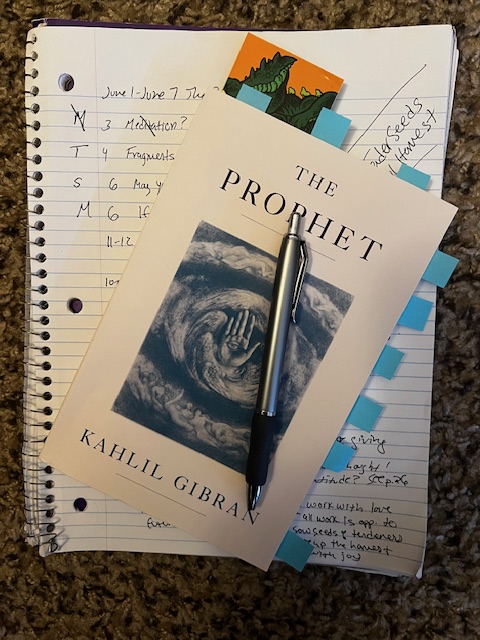Dear Friend,
How often do you avoid reading a book because you know you’re going to enjoy it?
I guess that sounds like a strange thing to do, but I’ve caught myself doing it a number of times. It’s probably some kind of appeal to delayed gratification. Maybe a better question is, how often are you surprised by just how much you’re enjoying that book you knew you’d enjoy?

As I started reading The Prophet, pen and book flags at the ready, I knew I’d probably be heavily engaged in annotating this one. I didn’t quite expect, though, that I’d have to start having a conversation with myself about which pages I really wanted to flag with my little sticky notes. It’s a funny situation to be in, since, as a professor, I often try to teach my students annotation techniques for active reading, and one of the lessons is how to avoid “over-annotating.” But a good book is a good book! And these first 30 pages of The Prophet are filled with such wisdom and such beauty, one wants to remember everything.
Almustafa, “the chosen and the beloved” (3) is a prophet living in the city of Orphalese. He’s been waiting for the ship that would bring him home, and as it arrives, the people stop him and ask him to share his thoughts on a variety of topics before he goes. The topics in this first section include love, marriage, children, giving, eating and drinking, and work. His words are digestible morsels of wisdom for how to engage with each of the concepts in order to live a good and holy life.
For example, two of the examples that stand out most to me are the sections on marriage and children. In the chapter on marriage, Gibran writes, “sing and dance together and be joyous, but be each one of you alone, even as the strings of a lute are alone, though they quiver with the same music” (16). Metaphor is so well done throughout the book thus far, but this one speaks–or sings–to me, personally. The message of the entire piece is that relationships are strongest and most effective when each person remembers to be an individual and to respect and prioritize the individuality of the other. It reminds me of my Buddhist teachings of non-attachment. We can do such beautiful things together, more than we could ever do alone, and yet everyone leaves, everything ends, every season passes. So, we must honor and cherish the impermanent.

The chapter on children hits a little hard for me, as a person with no children who has always wanted to be a parent. This section is only a few pages long, but its wisdom is deep and timeless. “You may strive to be like [your children],” the prophet says, “but seek not to make them like you” (18). In other words, our children are a gift of the future, and they should guide our way forward, rather than us limiting them to our own experiences. It reminds me of my goals as a teacher, to provide the tools and practice for self-education. While I might provide a foundation for learning and a safe place to engage, it is the students who ultimately make the future.
Gibran emphasizes this later in the chapter, with my favorite metaphor in the book so far. “You are the bows from which your children as living arrows are set forth . . . let your bending in the archer’s hands be for gladness; for even as He loves the arrow that flies, so He loves also the bow that is stable” (20). To me, this is a reminder that we all have a purpose, and so long as we are fulfilling that purpose, and it is good, we should be joyful and glad. We don’t need to try to be anyone else, just be who we are in that moment of our lives. When you’re the bow, be the bow. When you’re the arrow, be the arrow. The archer needs both, and both need each other.
One section in this part of the book that challenges me is the chapter on gratitude. The prophet cautions that we should carry “no weight of gratitude” (24) because it gets in the way of living a good life without ulterior motive, or the need to return favors. I believe strongly in living a life filled with gratitude, however, so I’ll be returning to these pages to engage more with this in the future, even if just to refine my beliefs in the merits of a grateful life.
Meditation
“If this is my day of harvest, in what fields have I sowed the seed, and in what unremembered seasons?” -Kahlil Gibran
May your evening be your dawn,
~Adam
Leave a comment